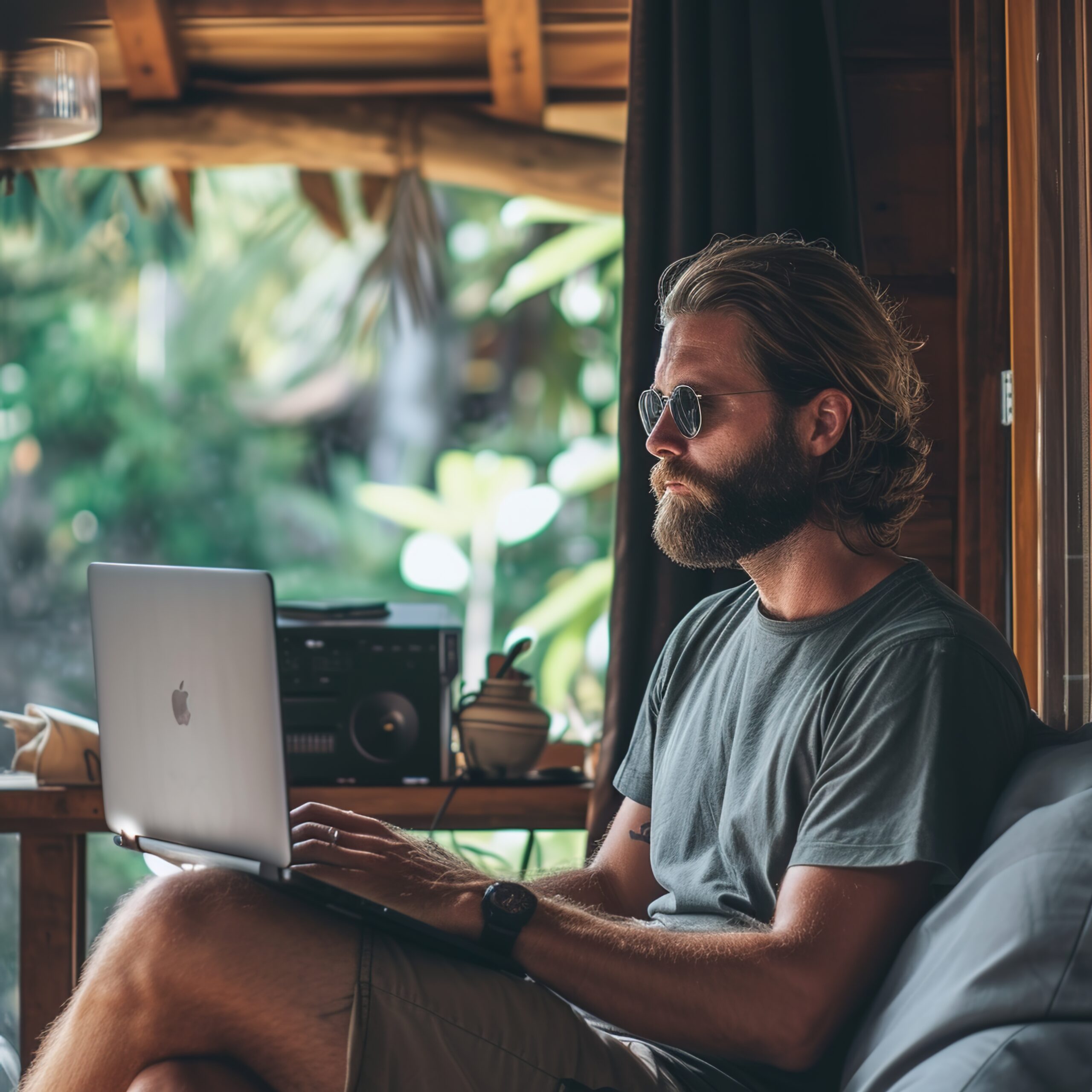Embrace the Digital Nomad Movement
Living a freedom lifestyle is about breaking free from the traditional 9-to-5 grind and exploring the world on your own terms. Digital nomadism offers a unique path to this freedom. By harnessing the power of technology, you can work from anywhere and live a life of adventure. The digital nomad lifestyle is a blend of work and travel that allows you to explore new places while maintaining your career. Imagine working from a sunny beach in Bali or a cozy café in Paris. This is not just a dream; it can be your reality if you embrace the principles of digital nomadism.
We strongly recommend that you check out our guide on how to take advantage of AI in today’s passive income economy.
Table of Contents
Finding the Right Work for Your Freedom Lifestyle
The first step in achieving your freedom lifestyle through digital nomadism is finding the right kind of work. Not all jobs are suited for remote work. Ideally, you want a career that allows you to work online. Freelancing, consulting, and remote positions in tech and digital marketing are great options.
Freelancing gives you flexibility and control over your work schedule. You can choose projects that interest you and work with clients from around the world. Consulting also offers flexibility and can be very lucrative, especially if you have specialized skills. Remote positions in tech, design, and marketing often offer competitive salaries and the freedom to work from anywhere.
To succeed in the digital nomad lifestyle, focus on building skills that are in high demand online. This might involve taking courses or gaining certifications in areas like web development, graphic design, or digital marketing. These skills will not only make you more employable but also give you the flexibility to work from anywhere in the world.
Creating a Plan for Your Freedom Lifestyle
Before you can fully embrace the freedom lifestyle, you need to create a detailed plan. This plan should include your financial goals, preferred destinations, and a timeline for your transition.
Start by evaluating your current financial situation. How much do you need to save before you can leave your traditional job? Create a budget that includes travel expenses, accommodation, and a safety net for unexpected costs.
Next, choose your destinations carefully. Consider factors like cost of living, internet reliability, and safety. Some popular digital nomad hubs include Chiang Mai, Medellín, and Lisbon. These locations offer a supportive community of digital nomads and affordable living costs.
Finally, set a timeline for your transition. Decide when you want to start your journey and create a list of tasks to complete before you leave. This might include finding remote work opportunities, organizing your travel logistics, and setting up your online presence.
Building Your Online Presence for the Freedom Lifestyle
A strong online presence is crucial for digital nomadism. It helps you attract clients, network with other professionals, and find new opportunities.
Start by creating a professional website that showcases your skills and services. This website should include a portfolio of your work, client testimonials, and contact information.
Social media is another important tool for building your online presence. Use platforms like LinkedIn, Twitter, and Instagram to connect with other digital nomads, potential clients, and industry experts. Share content related to your field and engage with your audience to build your reputation.
Networking online can also help you find new opportunities and stay updated on industry trends. Join forums, groups, and communities related to your field. Participate in discussions, share your expertise, and build relationships with other professionals.
Navigating Challenges in the Freedom Lifestyle
While the freedom lifestyle offers many benefits, it also comes with its own set of challenges. These can include dealing with time zone differences, managing a remote team, and maintaining a healthy work-life balance.
Time zone differences can be tricky, especially if you’re working with clients or team members in different parts of the world. Use tools like World Time Buddy to schedule meetings and manage your time effectively.
Managing a remote team requires clear communication and strong organizational skills. Use project management tools like Asana or Trello to keep track of tasks and deadlines. Regular check-ins and clear expectations can help ensure that everyone stays on track.
Maintaining a healthy work-life balance is crucial when you’re working remotely. Set boundaries between work and personal time, and make sure to take breaks and enjoy your surroundings. Creating a dedicated workspace can also help you stay focused and productive.
Staying Productive While Living the Freedom Lifestyle
Productivity is key to enjoying a successful freedom lifestyle. Without a traditional office environment, it’s important to create a routine and set goals to keep yourself on track.
Start by setting daily and weekly goals for your work. Break down larger projects into manageable tasks and prioritize your to-do list. Use productivity tools like Todoist or Notion to stay organized and track your progress.
Create a routine that works for you. This might involve setting specific work hours, taking regular breaks, and scheduling time for exercise and relaxation. Finding a balance that works for you will help you stay productive and avoid burnout.
Also, make sure to create a comfortable and functional workspace. Whether you’re working from a co-working space, a café, or your accommodation, ensure that you have a reliable internet connection and all the tools you need to work efficiently.
Exploring New Destinations for the Freedom Lifestyle
One of the most exciting aspects of digital nomadism is the opportunity to explore new destinations. Choosing the right places to live and work can enhance your freedom lifestyle and make your experience more enjoyable.
Research different destinations based on factors like cost of living, climate, and local amenities. Some digital nomads prefer tropical locations with a low cost of living, while others might opt for vibrant cities with a strong expat community.
Consider joining local digital nomad groups or attending meetups to connect with other remote workers. These communities can provide valuable support, local tips, and networking opportunities.
Also, take the time to explore each destination. Immerse yourself in the local culture, try new foods, and enjoy the unique experiences that each place has to offer. This will enrich your travel experience and make your freedom lifestyle even more fulfilling.
Managing Finances for the Freedom Lifestyle
Financial management is crucial for a successful freedom lifestyle. Without a regular paycheck, it’s important to keep track of your income, expenses, and savings.
Start by setting up a budget that includes all your monthly expenses, such as accommodation, food, transportation, and entertainment. Use budgeting tools like Mint or YNAB to track your spending and stay within your budget.
Create an emergency fund to cover unexpected expenses or income fluctuations. Aim to save at least three to six months’ worth of living expenses. This will give you peace of mind and financial security while you’re on the road.
Also, consider diversifying your income streams. Relying on a single source of income can be risky, especially if you’re freelancing or running a small business. Explore additional income opportunities, such as passive income or side gigs, to increase your financial stability.
Embracing the Freedom Lifestyle with Confidence
Adopting a freedom lifestyle through digital nomadism requires confidence and a willingness to embrace change. It’s important to believe in your ability to succeed and stay motivated even when faced with challenges.
Focus on your goals and remind yourself of the reasons why you chose this lifestyle. Whether it’s the desire for adventure, the need for flexibility, or the pursuit of personal growth, keeping your motivations in mind will help you stay on track.
Surround yourself with supportive people who understand and encourage your journey. Connect with other digital nomads, join online communities, and seek out mentors who can offer guidance and support.
Lastly, be open to learning and adapting as you go. The digital nomad lifestyle is a continuous journey of growth and discovery. Embrace the opportunities that come your way and enjoy the freedom and flexibility that this lifestyle offers.
This article is crafted to guide you through using digital nomadism to achieve the freedom lifestyle you desire. By following these steps, you can turn the dream of working from anywhere into a rewarding reality.
FAQs:
What is a freedom lifestyle?
A freedom lifestyle refers to a way of living that prioritizes personal autonomy, flexibility, and self-determination. It often involves breaking away from traditional work structures and societal expectations to create a life that aligns with your values and goals. This lifestyle typically includes elements like remote work, travel, and the ability to make choices based on personal desires rather than external constraints. It’s about crafting a life where you have the freedom to pursue your passions, work on your own terms, and enjoy a balance between work and personal life.
How do you have a freedom lifestyle?
Achieving a freedom lifestyle involves several key steps:
- Identify Your Goals: Determine what aspects of freedom are most important to you, whether it’s the ability to travel, work remotely, or have more time for hobbies and family.
- Financial Planning: Build a financial cushion to support your lifestyle. This might include saving up, creating multiple income streams, or investing wisely.
- Choose Flexible Work: Opt for jobs or career paths that offer flexibility, such as freelancing, consulting, or remote work opportunities.
- Embrace Minimalism: Simplify your possessions and commitments to reduce stress and increase your freedom of movement.
- Build Skills: Develop skills that allow you to work from anywhere, such as digital marketing, writing, or software development.
- Create a Plan: Develop a detailed plan for transitioning to your freedom lifestyle, including financial goals, work arrangements, and personal objectives.
- Stay Adaptable: Be prepared to adjust your plans and embrace changes as you navigate your new lifestyle.
What is the concept of freedom in life?
The concept of freedom in life is multifaceted and can vary from person to person. Broadly, it refers to the state of having the ability to make choices and decisions that align with your personal values, desires, and goals. This includes freedom from constraints imposed by others, whether they are societal, financial, or professional. In a broader sense, it encompasses both physical freedom, such as the ability to travel or live where you choose, and mental freedom, such as the freedom from stress, societal pressures, and the ability to think and act independently.
What does it mean to live a life of freedom?
Living a life of freedom means structuring your life in a way that allows you to pursue your passions, make your own choices, and enjoy a sense of autonomy and self-determination. It often involves:
- Flexibility: The ability to set your own schedule and make decisions based on your preferences rather than external obligations.
- Autonomy: Having control over your work, living environment, and daily activities.
- Personal Fulfillment: Engaging in activities and pursuits that bring you joy and satisfaction.
- Reduced Stress: Minimizing obligations and pressures that limit your ability to enjoy life.
Ultimately, living a life of freedom is about creating a balance that works for you and enables you to live in alignment with your core values and aspirations.

We strongly recommend that you check out our guide on how to take advantage of AI in today’s passive income economy.




